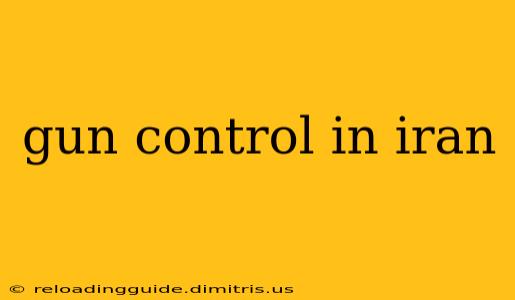Iran's gun control laws are a complex and often contradictory landscape, shaped by a unique blend of religious, political, and social factors. Unlike many Western nations with a focus on civilian disarmament, Iran's approach is more nuanced, reflecting its specific security concerns and societal structures. Understanding the intricacies of Iranian gun control requires examining its historical context, legal frameworks, and enforcement challenges.
The Historical Context: A Legacy of Conflict and Instability
Iran's history is punctuated by periods of conflict and revolution, influencing its approach to firearms regulation. The 1979 Islamic Revolution dramatically altered the political landscape, leading to significant shifts in security priorities. The Iran-Iraq War (1980-1988) further solidified the need for a strong military and paramilitary presence, impacting the accessibility and ownership of firearms. This historical context underscores the tension between the need for national security and the potential for civilian misuse of weapons.
Legal Frameworks: A Balancing Act Between Security and Civilian Access
While Iran doesn't have a single, easily accessible public document outlining all its gun control laws, the legal framework governing firearm ownership is primarily based on religious edicts, national security concerns, and specific regulations issued by relevant authorities. Licensing is crucial, and obtaining a license typically involves a rigorous vetting process, including background checks and assessments of the applicant's suitability.
Key Aspects of Iranian Gun Control:
- Licensing requirements: Stringent licensing processes are in place, designed to restrict access to firearms to those deemed trustworthy and with legitimate reasons for ownership. This usually involves extensive background checks and security clearances.
- Types of firearms permitted: The types of firearms permitted for civilian ownership are usually limited, with restrictions on automatic weapons and high-capacity magazines. Hunting rifles and shotguns are more readily available than handguns.
- Enforcement challenges: While the legal framework exists, consistent and effective enforcement remains a challenge. The vastness of the country, coupled with the complexities of its political and social landscape, creates difficulties in monitoring firearm ownership and preventing illicit trafficking.
- Black market activity: Despite the legal restrictions, a black market for firearms exists, feeding the demand from various sources, including criminal elements and those seeking to circumvent official channels.
Social and Political Implications: A Multifaceted Issue
The issue of gun control in Iran is deeply intertwined with social and political realities. The country's security apparatus, including the Islamic Revolutionary Guard Corps (IRGC) and the Basij militia, plays a significant role in shaping the narrative surrounding firearm ownership. The government’s concern about potential threats to its authority and the stability of the state significantly influences the regulatory approach.
Furthermore, societal attitudes towards firearms vary significantly. While hunting and sport shooting are legitimate activities for some, the overall societal context generally discourages widespread civilian ownership, with the emphasis on security and state control being paramount.
Conclusion: Ongoing Evolution and Future Prospects
Iran's gun control policies are a constantly evolving response to ongoing challenges. While the legal framework aims to control access to firearms, enforcement remains a significant obstacle. The future of gun control in Iran will depend on various factors, including evolving security concerns, socio-political dynamics, and the government's ongoing efforts to balance national security with the rights and needs of its citizens. Further research is crucial to gaining a comprehensive understanding of this complex issue and its implications for Iranian society.

